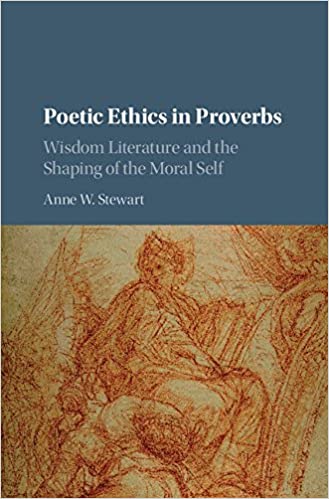
Anne Stewart’s Poetic Ethics in Proverbs (Cambridge University Press: 2016) is one of my favorite kinds of books: well-written, incredibly learned, and filled with fresh, stimulating insights into not only what the Bible means, but how it achieves meaning.
Stewart’s book has two main parts. In the first part, “Character and Poetry”, she talks about how the poetry of Proverbs works to shape our character. Not only are the longer discourses in Proverbs 1–9 poetic, but even the short, one-off statements in Proverbs 10–31 are instances of poetry: “Proverbs is poetry in the sense that it is highly stylized discourse that makes extensive use of sound play, vivid imagery, and paratactic syntax [that is, it puts lines next to each other without connectors like “therefore”], and is organized in lines…” (p. 39).
Poetry is a powerful way of conveying wisdom. One thing poetry does extremely well is that it packs powerful surprises that wake us up. “Within Proverbs, parallelism can … sharpen the ‘wit’ of a saying with an element of surprise.” (p. 43) For example, she cites Proverbs 13:7:
There is one who acts rich, but he has nothing.
There is one who acts poor, but he has great wealth.
(Prov 13:7; Stewart’s Translation)
She comments that in the first half of line 1, you expect it to end with a commentary on their wealth, instead it says he has nothing! And vice versa in line 2. The highly ordered poetry “conveys a disorder in the world. The symmetry in syntax conceals an asymmetry in sense” (p. 45).
The metaphors in poetry also awaken us to new insight. For example, Proverbs portrays Lady Wisdom as the ideal lover (Prov 3:15 // 31:10), giving us an idea of how ardently we should desire wisdom. (Stewart on p. 64 shows some parallels between Lady Wisdom and the Shulammite woman in the Song of Solomon; for example, both cry out in the streets, but they do not find their beloved; see Prov 1:20, 24; Song 3:2). As powerful as erotic desire is, so powerfully should we seek wisdom.
Another strategy Proverbs employs is to let false desires have their say. It gives voice to the wicked woman (ch. 7), and lays her speech alongside the calls of Lady Wisdom (ch. 8). Wisdom thus allows you to feel the power of each plea, but then it undermines the false desires, showing how they kill you in the end.
The second part of her book deals with four different models of character formation in the book. These are the modes the book adopts to actually shape and change you. (Do those sound valuable??)
- Rebuke: yes, there are straight-up challenges (e.g., Prov 1:22). But part of the ingenuity of the book is that it puts the listener within the group of fools (ch. 1), yet also separate from it, within hearing range of Wisdom and her rebukes (p. 93). It encourages by implying that there’s still hope!
- Motivation: Proverbs motivates us openly for the desire of wealth. But it doesn’t do so in a crass way. Rather, “wealth” is figurative for the ultimate gain which we all seek, genuine life. Indeed, “life” is the great common motivator, “an umbrella under which we have wealth, luxury, honor, and protection” and all the other specific motivations in the book (p. 113). Just read Proverbs 10 and there is an amazing array of motivations! The “carrot” is a biblical way of motivating!
- Desire: Proverbs produces “a desire to become a different kind of desirer” (p. 145, quoting Wayne Booth). Some of the Proverbs assume desire which we ought to have but which might not exist yet. E.g., Prov 10:1 (“a wise son makes a father glad”) assumes that we want to make our parents glad!
- Imagination: Proverbs is seeking to give us a godly moral imagination. Not imagination in the sense of “make-believe”, but in this sense: “According to wisdom, life is not a simple set of truths to be followed scrupulously, but a continual encounter with conflicting truths, each making competing claims upon the seeker. Wisdom views life as paradoxical, requiring discernment [imagination!] from situation to situation of how, when and if one should act” (p. 199, quoting Kathleen O’Connor). We need imaginative thinking to see how wisdom applies in each situation where we find ourselves.
Here are two take-aways: 1. when I read proverbs, I’m now asking questions like: how does this rebuke me? promise rewards? shape my desires? cause me to re-imagine in the world in new categories? 2. I’m now asking myself: how can I impart wisdom to others (e.g., my kids) using the same redemptive ways of speaking?
